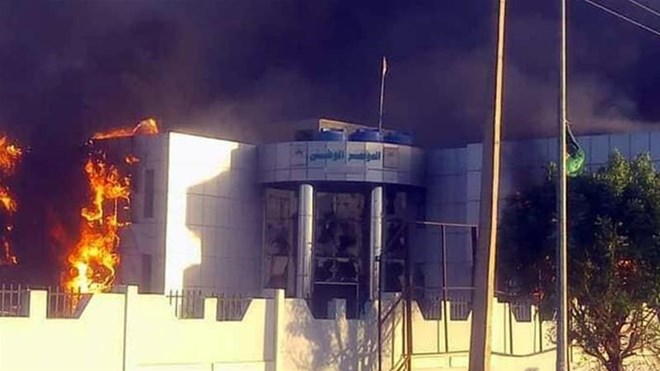
Thursday December 20, 2018

Protesters in Sudan have set fire to the ruling party's offices as part of a series of demonstrations against rising bread prices and shortages of fuel, both subsidised by the government.
Images circulating on social media showed the ruling National Conference Party's offices in Atbara, some 320km north of the capital Khartoum, being set on fire, while other fires were scattered across the streets at the centre of the protests.
Residents told Al Jazeera that the protests were triggered after bread prices increased from one Sudanese pound ($0.02) to three Sudanese pounds ($0.063).
The protests, which also broke out in the city of Port Sudan, the capital of Red Sea state, saw demonstrators call for the "overthrow of the regime", a slogan that was common during the Arab Spring uprisings that swept through the region in 2011.
Hatem al-Wassilah, the governor of the Nile River state, told Sudania 24 TV that a state of emergency had been declared in Atbara and a curfew imposed from 6pm local time (16:00 GMT) to 6am (4:00 GMT).
"The protests began peacefully and then turned to violence and vandalism ... We declared a state of emergency and a curfew and the closure of schools in the city," he said.
Prices triple
Bread prices have more than tripled since the start of this year after the government decided to stop importing wheat from overseas.
Officials had hoped the move would create competition between private companies importing wheat, and therefore act as a check on price rises - but a number of bakeries have since stopped production, citing a lack of flour.
This forced the government to increase flour subsidies by 40 percent in November.
In October, Sudan sharply devalued its currency from 29 pounds to the dollar to 47.5 after a body of banks and money changers set the country's exchange rate.
The move led to further price increases and a liquidity crunch, while the gap between the official and black market rates has continued to widen.
Sudan lost between 75 and 80 percent of its oil reserves in 2011 after the southern part of the country became an independent nation, denying the north billions of dollars in revenues.
In a separate development on Wednesday, leading opposition figure Sadiq al-Mahdi returned to the country after nearly a year in self-imposed exile.
Mahdi was overthrown in 1989 by a group of military commanders close to President Omar Hassan al-Bashir's National Congress Party.
"The regime has failed and there is economic deterioration and erosion of the national currency's value," Mahdi, who heads the Umma party, told thousands of his supporters.
His party has argued that Bashir must go in order to improve the country's image abroad and attract crucial investment and aid.